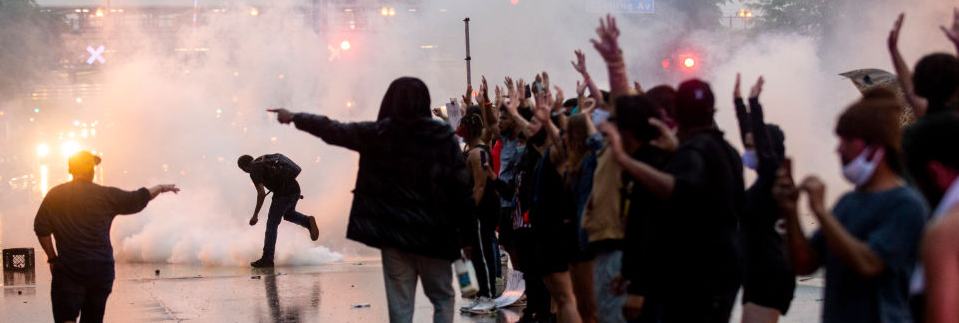In the weeks since George Floyd was killed by a white police officer who knelt on Floyd’s neck for nearly nine minutes, Americans have protested police brutality across the nation. By two to one in the latest Economist/YouGov Poll, the public says the death of Floyd was not an isolated incident, but part of a broader problem with police (65%).
It is rare to find views that cross racial and partisan boundaries, but some of these results do just that. More than four in five Americans (86%) believe the force used against Floyd by the police officer was unjustified; 85 percent approve of bringing the murder charge against that officer who pressed his knee into Floyd’s neck for nearly nine minutes. This survey was conducted before the officer’s charge was upgraded from third-degree murder to second-degree murder.
Three-quarters (77%) of Americans approve of the non-violent protests that followed Floyd’s death, though the violence and looting that followed in many cities is a different matter. Black Americans and white Americans agree on these questions, as do Democrats and Republicans.
However, Republicans are more positive than Democrats about policing in the United States. While two-thirds of the public overall think African-Americans do not receive equal treatment from the police, Republicans are evenly divided: 42 percent say black Americans do receive equal treatment from police, while 36 percent believe they do not.
Similarly, two in three Americans find a broad pattern in the deaths of black Americans at the hands of police, and that number has become larger in recent years. One in three see the deaths as isolated incidents. That is particularly true for Republicans, two-thirds of whom view those African-American deaths at the hands of police as isolated cases.
Opinions about the police action against Floyd and what followed indicates serious public concern about where the United States is when it comes to race relations. About seven in 10 Americans (72%) describe race relations as bad overall. That number is lower (69%) among white Americans and higher (87%) among black Americans, however. For more than half the country race relations have gotten worse since the 1960s, the era of the civil rights movement, racial tensions, and widespread protests.
But many feel differently about race relations at home: majorities of black Americans and white Americans believe race relations in their own communities are good, though white Americans (71%) are more likely than black Americans (56%) to think this. Overall, two-thirds (65%) view race relations in their own communities as good; one-third (33%) say they are bad.
Growing racial tension has affected several more general questions. Civil rights and civil liberties are considered a very important issue by 62 percent, up seven points from last week. In addition, Americans are more negative about the state of the country overall. Only one in four this week say the country is headed in the right direction, and two in three (65%) say it is off on the wrong track.
These are the worst evaluations of the state of the country during the Trump Presidency. The last time the responses on this question were close to those reported today were in the period surrounding the 2017 Charlottesville white supremacist rally after a counter-protester was killed by a car driven by a protester.
Then, as well as now, the president received low ratings for his handling of the situation. In this poll, a majority disapproves of how the president is handling the response to the current protests. Most Republicans, as they did after Charlottesville, approve. President Trump also receives low ratings for his handling of civil rights and civil liberties in general.
The president’s overall approval rating dropped four points in the last week. Now, 40 percent approve and 53 percent disapprove. On all three of these questions, there are enormous differences between white Americans and black Americans, though white Americans are either negative or closely divided on each.
Editor’s Note: The poll was conducted Sunday through Tuesday morning, with a majority of the respondents finishing the questionnaire before Monday evening’s events, including President Donald Trump's Rose Garden address
See the toplines and crosstabs from this week’s Economist/YouGov Poll
Related: Americans want President Trump subject to the same social media rules as everyone else
Image: Getty








